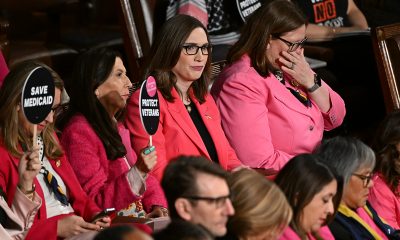Sports
Hudson Taylor: From athlete to ally
Hudson Taylor on his advocacy work — and the future for out athletes
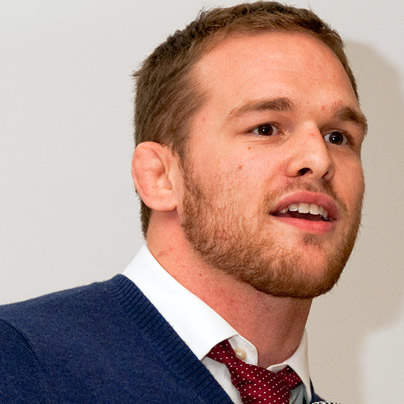
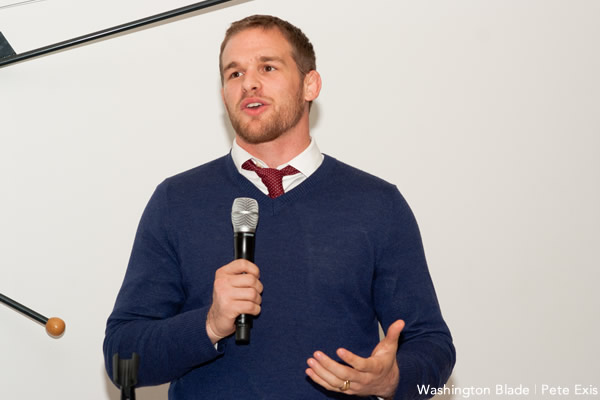
Hudson Taylor founded Athlete Ally in August 2010. (Washington Blade file photo by Pete Exis)
By ROBERT KLEMKO
Hudson Taylor, a former University of Maryland wrestler and current Columbia University assistant wrestling coach, saw the need in 2010 for a social advocacy group pushing for LGBT equality in sports. He founded Athlete Ally, a nonprofit organization focused on ending homophobia and transphobia in sports, three years ago.
We caught up with Taylor and got his thoughts on the success of the organization and the future for out professional athletes.
ROBERT KLEMKO: When did Athlete Ally explode from your part-time pursuit to this nationally recognized organization?
HUDSON TAYLOR: We started Athlete Ally in August 2010. The first year-and-a-half to two years was pretty slow. We were growing at the college level quite a bit. But the real expansion came when Ravens linebacker Brendon Ayanbadejo came on and we started getting more athletes getting involved last fall. After him, more and more athletes started lending their voice to LGBT acceptance in sports. In the NFL, Scott Fujita and Chris Kluwe came shortly after. Those are obviously three prominent voices in the NFL and for LGBT acceptance in sports.
FIND MORE OF THE WASHINGTON BLADE SPORTS ISSUE HERE.
KLEMKO: Did you recruit these guys, or did they come to you?
TAYLOR: We recruited the majority of the athletes we work with. We adopted a shotgun approach: If we have an athlete who speaks out for marriage equality or they have a relative who’s gay, we reach out and say ‘Are you interested in getting involved?’ For all the guys who’ve signed up we’ve gotten probably triple the amount of nos. We also got a ton of our athletes from Maryland connections; Kristi Tolliver, Robbie Rogers and D’Qwell Jackson included.
KLEMKO: Do you have a staff?
TAYLOR: Our board is very much a working board. We have 13 board members who are almost full time working on Athlete Ally. We’ve been very fortunate to have a very dedicated board. Then we have five interns and two college graduates that we’ve just hired, and we’ll be hiring more. What we’ve found is there are a lot of college kids who are eager to get involved.
KLEMKO: You went from recruiting the voices to becoming an authority on the topic. What’s the next step?
TAYLOR: When all of this started, I realized there’s never been a successful social advocacy group for the minority without the majority support. We knew we needed the voices. Now our next phase is really trending down to the K-12 age group. We’ve become the official partners of the NBA, working with their incoming players, and we have great reach in college, but the cycle starts far sooner than college. So when we think about these attitudes we need to start educating when they first pick up a baseball or a football.
KLEMKO: Where are you with the 18-and-under demographic?
TAYLOR: We haven’t made any partnerships with any school districts in a really major way. … Here’s the plan: We’re currently creating a curriculum to train college athletes to go back into their high schools and middle schools and train the younger generation. Those guys are going to have more impact than any of these guys could. There’s a certain amount of cultural capital that athletes have with the ability to change hearts and minds in these difficult environments.
KLEMKO: Who reaches out to you the most, personally?
TAYLOR: A lot of folks that I’ve known growing up have reached out to me because either they are closeted or they have friends or family who are closeted. It became clear that a huge number of people I’ve known are affected by homophobia in sports. There have been closeted professional athletes who have reached out, but we’re still at the very beginning… there’s still a lot of fear and uncertainty for the closeted gay athlete.
KLEMKO: For the athlete who wants to help, but doesn’t want to attach his name to Athlete Ally, what’s your advice?
TAYLOR: The biggest question is, how do we explicitly go about creating an inclusive environment to everyone? Joining Athlete Ally is on one end of the spectrum, but you can also as an athlete pick five words in your life to eliminate. Say something to a teammate next time you hear an anti-gay word in the locker room. That’s a start.
KLEMKO: Is the bigger obstacle for your mission in the front offices, or in the locker rooms?
TAYLOR: I think it’s really difficult to make an overarching statement about that. No two experiences are exactly alike. Fears and apprehension that one closeted athlete has can be completely different from another. That said, the average NBA career is 4.7 years. It’s even shorter for NFL players. So if coming out is going to hurt an athlete’s belief that they can make a team and stay in the league, that’s an obstacle. On the other hand, you can have a really supportive owner or franchise but if you’re on a team that is using anti-gay language every day, a closeted athlete is not going to feel safe to come out in that space.
KLEMKO: Jason Collins popped the NBA’s cherry. How do we get the ball rolling in the NFL?
TAYLOR: Until we have a critical mass of athletes speaking out, you’re not going to see more athletes coming out. Some of the most vocal athletes have been NFL players, but when you look at how many guys have spoken out, it’s still a very small percentage. Were going to need more players, coaches and owners speaking out for real change to happen.
Robert Klemko is a University of Maryland graduate and a writer for TheMMQB.com, Sports Illustrated magazine’s online NFL destination by Peter King.

FIFA has announced Saudi Arabia will host the 2034 World Cup, despite concerns over its human rights record that includes the death penalty for homosexuality.
The Associated Press reported FIFA confirmed the decision on Dec. 18. The AP noted Saudi Arabia is the only country that bid to host the 2034 World Cup.
“This is a historic moment for Saudi Arabia and a dream come true for all our 32 million people who simply love the game,” said Sport Minister Prince Abdulaziz bin Turki Al- Faisal, who is also president of the Saudi Olympic and Paralympic Committee, in a statement the Saudi Press Agency posted to its website.
Saudi Arabia is among the handful of countries in which consensual same-sex sexual relations remain punishable by death.
A U.S. intelligence report concluded Saudi Crown Prince Mohammed bin Salman “likely approved” the murder of Jamal Khashoggi, a Washington Post columnist, inside the Saudi Consulate in Istanbul in 2018. A federal judge in 2022 dismissed a lawsuit against Prince Mohammed after the Biden-Harris administration said he was immune to the lawsuit because he is the country’s prime minister.
Human rights activists have also criticized the Saudi government over the treatment of women, migrant workers, and other groups in the country.
“No one should be surprised by this,” Cyd Zeigler, Jr., co-founder of Outsports.com, an LGBTQ sports website, told the Washington Blade in an email after FIFA confirmed Saudi Arabia will host the 2034 World Cup. “FIFA, the International Olympic Committee, and many other world governing bodies routinely turn to authoritarian countries with terrible human-rights records to host major sporting events. There are simply few other countries willing to spend the billions of dollars it takes to build the needed infrastructure.”
Peter Tatchell, a long-time LGBTQ activist from the U.K. who is director of the Peter Tatchell Foundation, in a statement described FIFA’s decision as “a betrayal of the values that football should stand for: Inclusivity, fairness, and respect for human rights.”
“This is not about football; it’s about sportswashing,” said Tatchell. “The Saudi regime is using the World Cup to launder its international image and distract from its brutal abuses. By granting them this platform, FIFA is complicit in whitewashing their crimes.”
Qatar, which borders Saudi Arabia, hosted the 2022 World Cup.
Consensual same-sex sexual relations remain criminalized in Qatar.
“Saudi Arabia was the only country to bid for the 2034 FIFA World Cup,” said Zeigler. “So, until FIFA, the IOC (International Olympic Committee) and other governing bodies ban major human-rights violators from hosting, we’ll continue to see events like this in Saudi Arabia, China, Qatar, and other countries with terrible LGBTQ rights issues.”
The Blade has reached out to FIFA and the Saudi government for comment.
Sports
Controversy grows over member of Calif. university’s women’s volleyball team
Coach suspended, NCAA sued, more rivals forfeit
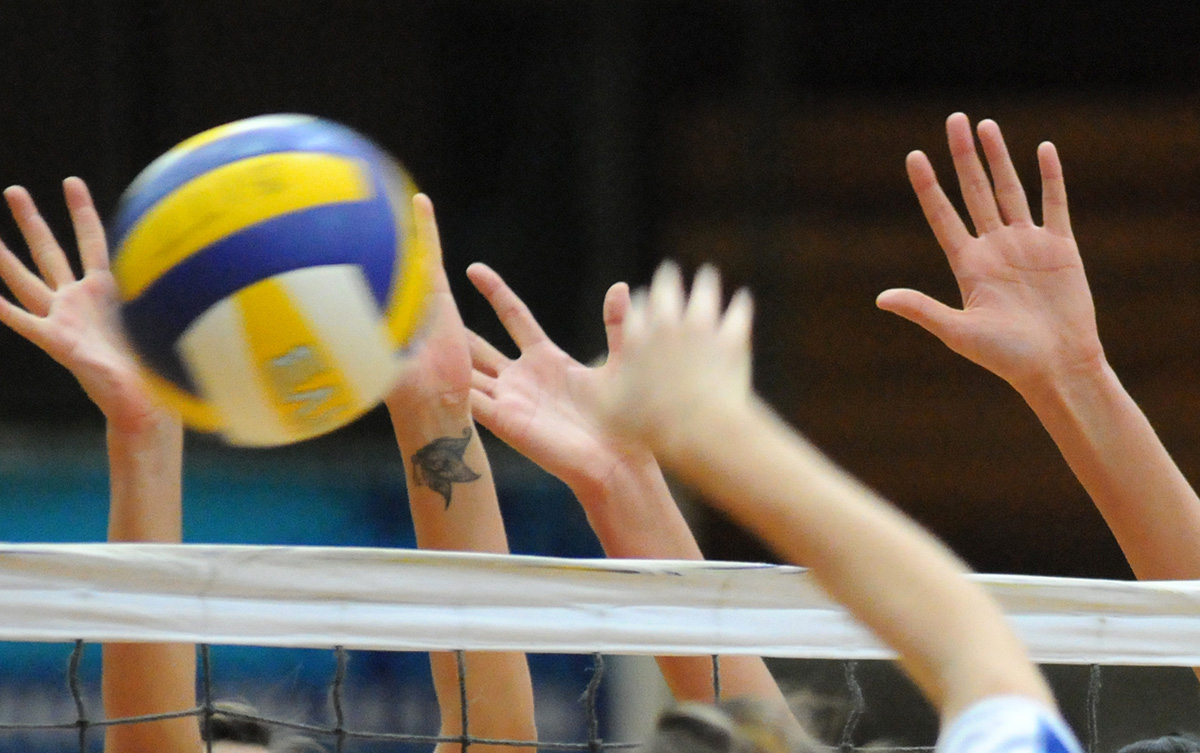
San Jose State University’s women volleyball team has collected yet another W by forfeit — its seventh so far this season — as controversy swirls around one player on its roster. She’s one of the seniors, and she has been dragged in the media by her own co-captain, who outed her as transgender.
The Washington Blade is not naming this student athlete since neither she nor the school have confirmed or even commented on her gender identity.
SJSU visited San Diego last weekend for a match before the Aztecs’ biggest home crowd of the season — including protesters waving “Save Women’s Sports” banners and booing one player on the Spartans team in particular: The woman who is reported to be trans.
Security was tight, with metal detectors and extra guards and police officers present. Video posted to YouTube by a right-wing sports media site — which names the player — shows an angry fan arguing with security about his First Amendment rights.
Video recorded during Nov. 9’s game shows a player for San Diego was injured following a spike by the player rumored to be trans, and had to be helped off the court. However, the video clearly shows that player was injured by landing poorly on one foot, not as a result of the spike.
The Aztecs defeated the Spartans 3-1, but San Jose has still punched its ticket to the conference finals, thanks to its record number of forfeits.
Wyoming was set to visit SJSU Thursday, but for the second time is joining other universities that have forfeited games against the Spartans, all without providing a reason. Boise State announced it will forfeit an upcoming match set for Nov. 21, its second forfeit against SJSU.
In September, the Spartans’ co-captain, senior Brooke Slusser, outed her own teammate, the player at the center of this controversy, in joining a federal lawsuit against the NCAA spearheaded by anti-trans inclusion activist and former college athlete Riley Gaines.
Slusser said in the lawsuit and in subsequent interviews that the player in question shouldn’t be on her team. The suit claims the NCAA’s policy on trans athletes violates Title IX by allowing “men” to compete in women’s sports and use women’s locker rooms where they display “full male genitalia.”
The NCAA policy for trans athletes participating in women’s volleyball aligns with that of USA Volleyball, which requires trans female athletes to suppress their testosterone below 10 nmol/L for a period of one year before competition. That is also how the NCAA determines eligibility. SJSU has stated repeatedly that all its players are eligible.
The lawsuit also asks the NCAA to revoke any titles or records won by trans female athletes in women’s competitions, which seems to be specifically aimed at stripping out trans NCAA champions Lia Thomas and CeCé Telfer of their titles in swimming and track and field, respectively.
Prior to this season, the player rumored to be trans did not attract any attention other than being a successful starter, like Slusser. But now that she is in the media spotlight, Slusser has come forward to tell right wing media, including Megyn Kelly, why she feels another woman two inches taller than she is poses a danger.
“I don’t feel safe,” Slusser said on “The Megyn Kelly Show” last month. “I’ve gone to my coaches and said I refuse to play against [her] … It’s not safe.”
In the video, both Kelly and Slusser refer to the player as “him” and a “man,” and name her.
Now comes another twist: San Jose State University suspended associate head coach Melissa Batie-Smoose with pay, indefinitely, after she filed a Title IX complaint against SJSU. She claims the player Slusser identified as trans conspired with an opponent to help the team lose a match and injure Slusser. Batie-Smoose named the player in question in her complaint and on Sept. 23, joined the same lawsuit that Slusser is now a part of.
“Safety is being taken away from women,” Batie-Smoose told Fox News. “Fair play is taken away from women. We need more and more people to do this and fight this fight because women’s sports, as we know it right now will be forever changed.”
Media reporting on the suspension, including Fox News, continue to name the athlete in question, with some also reporting what they say is the athlete’s birth name.
San Jose State released a statement following the suspension of Batie-Smoose: “The associate head coach of the San Jose State University women’s volleyball team is not with the team at this time, and we will not provide further information on this matter,” the team said.
SJSU Coach Todd Kress told ESPN that reports saying that any member of the Spartans colluded with their opponent are “littered with lies.”
The Spartans are currently among the top six finishers in the Mountain West Conference that will qualify to compete in the conference tournament scheduled for Nov. 27-30.
Sports
University of Nevada forfeits game rather than play possible trans athlete
Women’s volleyball team cites ‘not enough players to compete’
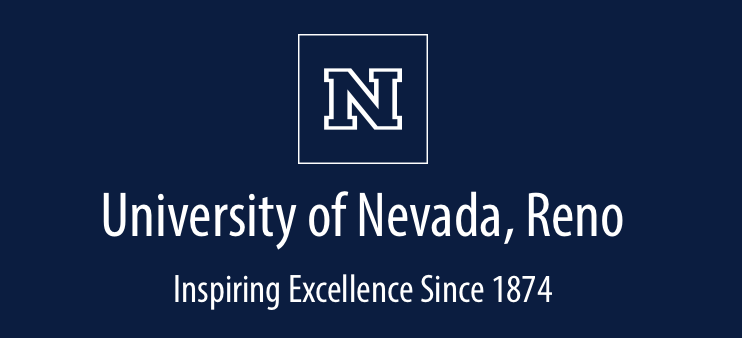
For the fifth time, a women’s volleyball team has chosen to forfeit instead of play against San Jose State University, because of rumors that one of its players is a transgender woman.
The University of Nevada, Reno, officially announced on Friday that it would forfeit Saturday’s game against the SJSU Spartans. This followed an announcement by Wolf Pack players who said they “refuse to participate in any match that advances injustice against female athletes,” without providing further details.
Originally, Nevada’s athletic department had said the program would not back out from the match, citing state equality laws, but also said that no players would be disciplined if they chose to not participate.
“The vast majority of our team decided this is something we wanted to take a stand on,” Nevada team captain Sia Liilii told Fox News. “We didn’t want to play against a male player.”
“In all of our team meetings it just kept coming back to the fact that men do not belong in women’s sports. If you’re born a biological male, you don’t belong in women’s sports. It’s not even about this individual athlete. It’s about fair competition and safety for everyone.”
Outsports and several conservative and right-wing websites have identified the player who is rumored to be trans, but the Washington Blade has opted to not do so since she herself has not come forward to either acknowledge or deny she is trans.
As ESPN reported, Nevada follows Southern Utah, Boise State, Wyoming, and Utah State in canceling games against the Spartans. Boise State, Wyoming, Utah State, and Nevada are all members of the Mountain West Conference, so those contests are considered forfeits and count as valuable wins in the league standings for San Jose State.
Riley Gaines, the anti-trans inclusion activist for the Independent Women’s Forum has joined the chorus in claiming the Spartans’ roster includes a trans woman.
If you're wondering why teams are forfeiting against @SJSU, here's the reason.
Last night another woman was smashed in the face by a kill from a man posing as a woman.
It's unfair, unsafe, and regressive, yet our "leaders" remain silent. pic.twitter.com/OS15AFxQsp
— Riley Gaines (@Riley_Gaines_) October 18, 2024
Despite this, neither San Jose State nor any of the other forfeiting teams have said the university’s women’s volleyball team has a trans player. SJSU issued a statement defending its roster.
“Our athletes all comply with NCAA and Mountain West Conference policies and they are eligible to play under the rules of those organizations. We will continue to take measures to prioritize the health and safety of our students while they pursue their earned opportunities to compete,” the statement read.
The governors of Idaho, Nevada, Utah, and Wyoming — all of whom are members of the Republican Party — have issued public statements supporting the cancellations, claiming it’s in the interest of fairness in women’s sports. This week, Donald Trump, the GOP presidential nominee and former president, spoke at a Fox News televised town hall when asked about trans athletes in women’s sports.
“We’re not going to let it happen,” Trump said. “We stop it, we stop it, we absolutely stop it. We can’t have it. You just ban it. The president bans it. You don’t let it happen. It’s not a big deal.”





